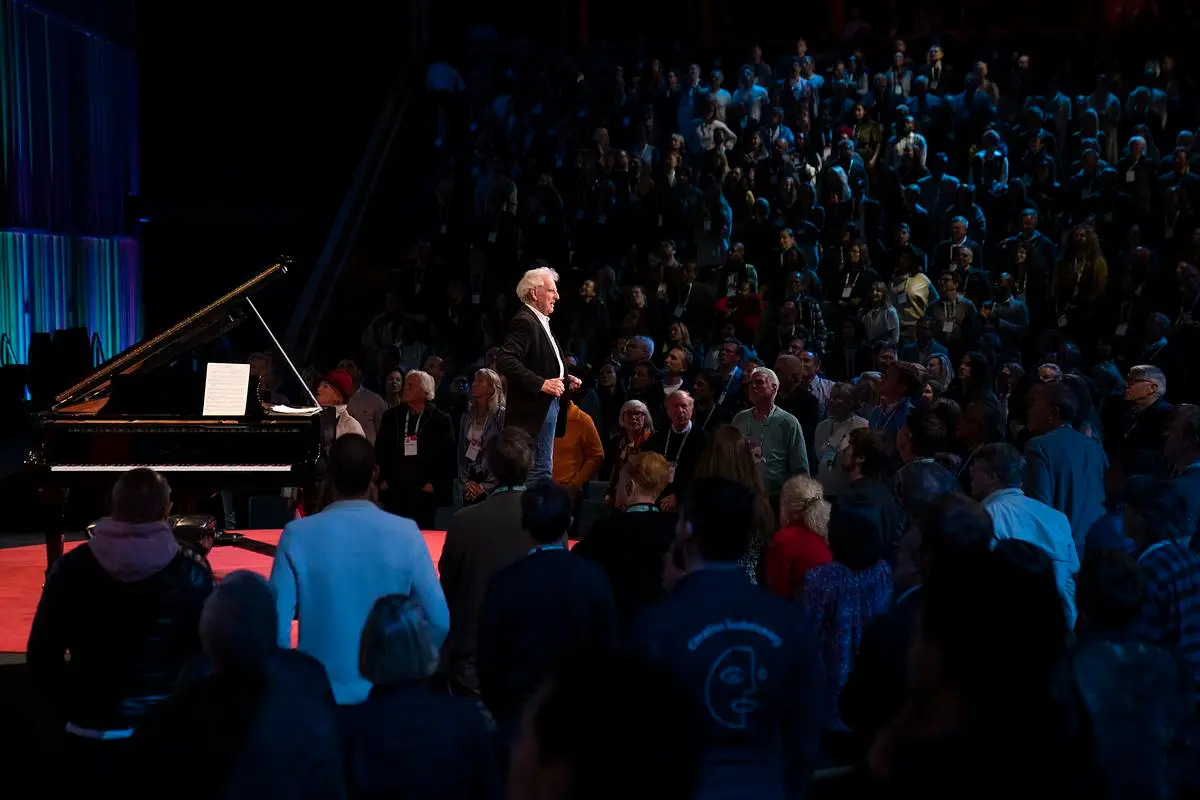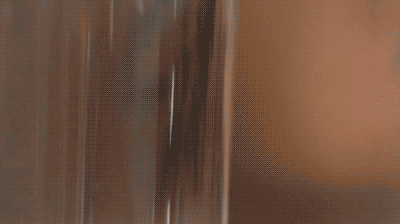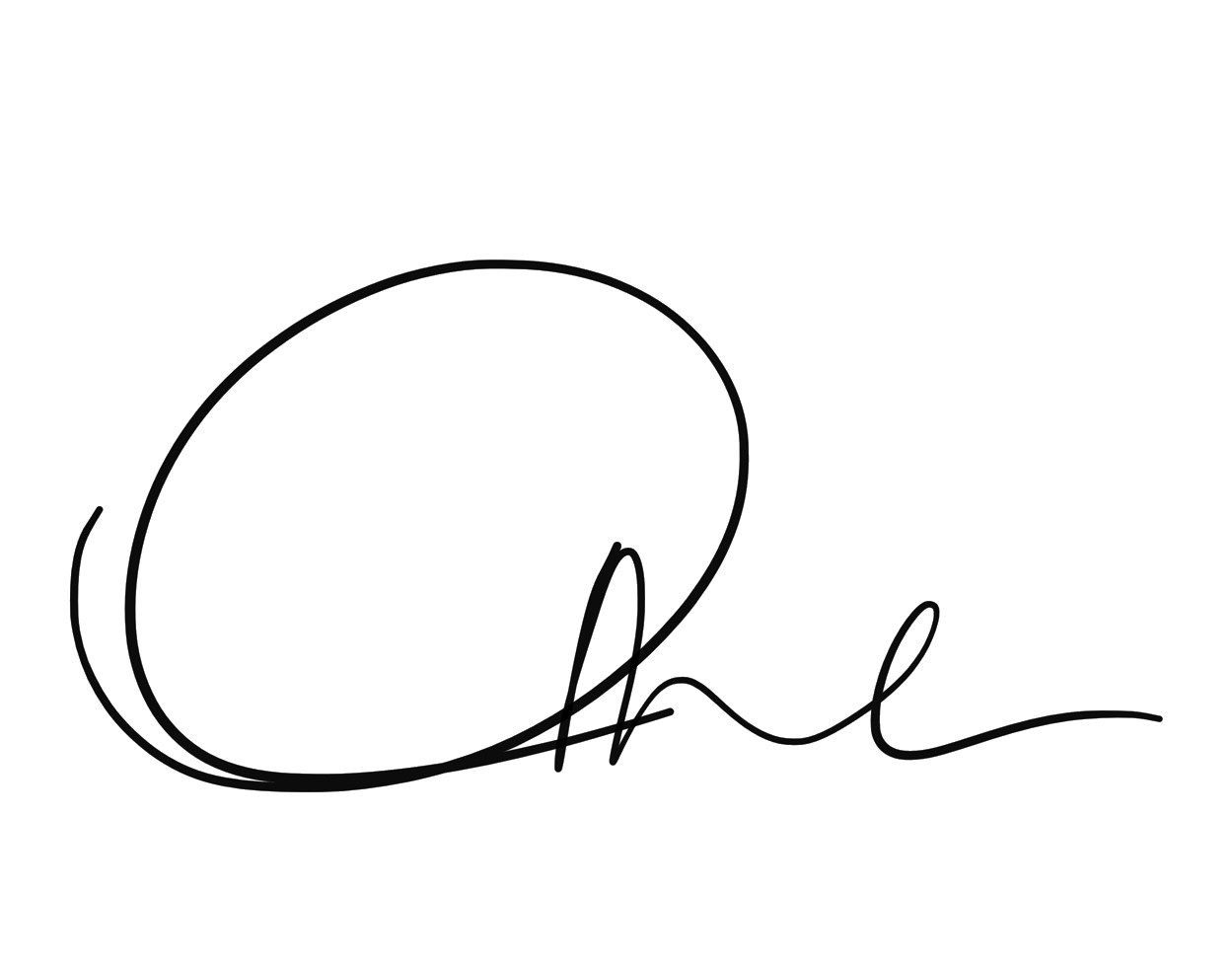I can’t quite pinpoint when it became a dream of mine to attend TED, though I realise that the fantasy was greatly enhanced by the boundaries imposed by the pandemic. Keen on both intellectual stimulation and connection, this however afforded me the opportunity to join several TED events online, getting a taste of the real thing. Because, as I hadn’t quite understood, there’s a lot more to it than the online streaming of the talks (and the podcasts). Making it impossible to gather for so long, TED became, in my mind, the ultimate gathering. It felt so bold when I signed up almost 12 months ago; I was not only going towards that dream but making a bet on the future and the possibility of international travel.
I registered! And serendipitously (or not), it so happened that the theme of this year’s conference was Possibility.
It all started very well, propitiously even; the ever-present rain had stopped when I made my way to the Vancouver Convention Centre on Sunday night for the newcomer reception in honour of us newbies attending the TED conference for the first time.
The check-in was a reveal: smooth, fast, and friendly, full of surprise and delight. “This bodes well for the week ahead,” I told myself. It’s also bound to make every other conference I attend feel like a disappointment!
After staring a moment at the giant red TED logo above me over the entrance doors, I almost pinched myself as I made my way to the cocktail reception on the second floor. I didn’t give myself the time to consider that I was attending alone because, eek! So much excitement it distracted me away from that thought.
I heard a friendly female voice behind me saying: “Nice coat”. Covered in a big teddy burgundy overcoat (not great for travel but ideal for Vancouver’s spring) I turned to find a lady behind me on the escalator, sporting a big smile as I thanked her for the compliment. She was wearing a cool hat and even cooler oversized square glasses. Heidi was the name on her badge. At TED, the badges are very important as I found out (not just to gain entry to the conference): Name, location, occupation, as well as selected keywords to spark conversation with each other. Mine were shoes, podcast, meditation, write - for writer, oops, I was stretching my allocation of words right up to that character limit. After the conference, roaming in the airport, I concluded that these badges would prove useful in the real world as well. How much easier would it be to connect, right? Anyway, Heidi and I started chatting, and we walked through to that first party, newbies together.
We were welcomed into a massive open-plan space with sprawling floor-to-ceiling windows through which I saw the ocean and mountains in the distance. Despite the grey cloud cover, I was impressed by the view.
It felt like I had arrived, not just in Vancouver, but in life.
The ticket price for TED is steep. Even though I came in on the lowest tier available, I quickly picked up that the money was going towards a delicately designed experience, including the talks, but also commissioning artists, entertainment, the well-appointed theatre, overflow of coffee (thank god for the coffee), but also parties, activities, dinners, etc). And yes, that money also goes towards making the talks free to everyone else online.
After grabbing a drink with Heidi and ex-Meta AI developer turned full-time painter Marc, I wandered around. The Ocean Foyer (a giant L-shaped hall) was crowded, everyone buzzing with excitement: renowned psychotherapist, author and past TED speaker Esther Perel was due to usher us into this week-long experience.
The cocktail tables dotted around the space were covered in her cards, from the game Where Should We Begin - A Game of Stories. We didn’t have to wait long; she arrived and settled on a small raised platform alongside one of the TED hosts, who interviewed her for our icebreaker.
Ms Perel was perhaps surprised (I certainly was) that instead of standing to listen to her, the crowd near the stage decided to sit on the carpeted floor, immediately starting a wave. As we all sat down, it felt like story time indeed.
Ms Perel proved an excellent guest to break the ice. First, she asked us to consider how we got here, to TED, and who we’d left behind at home, allowing us to be here. And to feel grateful. For me, it was trusted house sitters looking after my fur family that I silently thanked. She then invited us to be present, saying something along the lines of: “When you get here, be here, leave it [the rest, the life at home] behind.”
This was an entry to a suggestion that became a guideline in the theatre during the talks: be here, aka don’t be on your phone. “Stop stroking the fetish,” were her words. We laughed. It felt true, funny, and room-wide, a collective problem we’d have to face for the week (or the foreseeable future until a new AI technology arrives to take away our screens).
Then, taking in the crowd around her, she prompted us, asking who among us, most new here, some alone like I was, felt vulnerable in this large gathering. I raised my hand a bit. Most hands around me went up too.
She followed that first prompt by asking who felt like they were having a mild case of imposter syndrome. Ooh me, I thought; I raised my hand again.
Then who had a severe case of imposter syndrome? A few more hands went up. She laughed and said: ‘Self-esteem doesn’t need to be a competitive experience.’
This introduction was short, sweet, and effective. The energy of our large group felt almost palpable: we’d come to know something about each other already without speaking. Most of us felt vulnerable, perhaps out of place, and wanted to connect. We were to use the cards to get to know each other, and unless using it for TED Connect (the app that powers connection during TED conferences, online and IRL), we should abstain from stroking the fetish.
It worked. I turned around, started talking to a lovely group of women, and a very personal conversation followed, each of us contributing a meaningful story about ourselves to the small group. Ms Perel had explained: you may meet many people this week, and you may not remember them, but you will remember the stories. Walking back to my hotel (early, I must add as I wanted to be fresh for the week ahead), I thought, how great is this!
The next day, and for the remainder of the conference, however, the imposter syndrome came back to haunt me, hard. Sure, it didn’t help that, after feeling run down at the weekend, I had developed mild tonsillitis and a fever to boot. I felt a bit sorry for myself, although I was immensely grateful it wasn’t anything worse, COVID, flu or something else contagious.
While the sessions and the speakers left me feeling high, a good kind of high, which produced a feeling of connection, belonging, and being right where I needed to be, walking the halls of the conference centre often left me feeling rather puzzlingly quite small. I thought to myself: “Small fish.” As in, I am a small fish, out of her depth here.
Sure enough, that’s one of the possible reactions one could feel when surrounded by such inspiring and accomplished people (or fish).
My tried and tested tactic is to look after my energy. So, I went for a rest as often as I could, during lunchtime or on breaks, and gathered all my energy to attend, enjoy and take in the talks (and to fight the infection). As a result, going beyond my enthusiastic introverted nature felt impossible most days.
I had many ‘pinch me moments’ during the week, particularly in the theatre. For example, when conductor and previous TED speaker, Boston Philharmonic’s own Benjamin Zander came on stage during the powerful first session (I am a big fan of his work, especially his book The Art of Possibility which sparked this archive post). Sure enough, with the help of his grand piano, he had all 1800 of us sing Beethoven’s chorus of Ode to Joy, in German, while telling us stories about going ‘beyond the fuck off’ (also known as the acronym BTFO).

Another memorable moment was when Canadian conservation technology researcher Karen Bakker shared hidden sounds, taking us on an amazing journey into the illusion of silence and the possibility of inter-species communication.
And when Gus Worland, a mental fitness advocate, made his case for us to proactively be there for each other with his movement ‘Gotcha4life’ after telling us the devastating story of his mentor taking his own life.
Finally, when death dula Alua Arthur (for many, this was THE talk of the week) invited us to look at life from the perspective of death, to be present in our bodies, and talked about what it would bring if we were to choose to die with intention. At some point, she laughed and said: And eat the cake, she added, just eat the cake!
Multiple times, I was moved to tears, by the activists Golshifteh Farahani and Nadya Tolokonnikova of Pussy Riots, by neurotechnologist and ethicist Nita Farahany, and later by Sarah Jones, the polymorphic film-maker who shared a personal story on cancel culture.
What these speakers all had in common was what I read best explained TED’s own Chris Anderson:
“It's an unspoken but powerful interaction. If a speaker lets down his guard, so does the audience. If a speaker stays distant and safe, the audience will too.”
And yet, in between the talks, and coffee rounds, walking the great big hall, the thought came back. ‘Small fish. Small fish.’ It’s worth nothing that these words, that thought, were new. It’s not something that I ever remember saying to myself before. And perhaps because they were so odd, I paid notice.
My interactions with other attendees, however, didn’t reinforce my ‘small fish’ syndrome. No one made me feel like a ‘little fish.’ On the contrary, perhaps because it had been established, thanks to Esther Perel, that many of us felt like impostors, every conversation I got to engage in was kind, open, and uplifting.
And yet, as I roamed the halls, the thought kept coming back, the grooves of this limiting, ‘I’m just a small fish’ belief etching themselves further into my brain.
Then, some three days into this litany, an old memory popped up that brought the fish metaphor into a very different light for me. And gosh, I love a good metaphor.
There’s this story in my family that makes my brother Guillaume howl with laughter. Allegedly (I haven’t seen this myself), when I was a cute toddler, all dimples and Venetian blond curls, I made up a song and dance for my parents (and the local beachgoers) while visiting family in the South of France. My father, a wonderful amateur photographer, had started recording memories with his fancy new super8 camera. That day, he filmed me (or us? I’m not sure whether my brother was already around), frolicking by the sea, and grabbing the microphone, attached by a cord to the camera. Then looking directly into said camera, I sang a song I’d made up about ‘un petit poisson’. (Yes, that’s little fish in French).
My brother was massively amused by it because I spent my teenage years, and my twenties, singing* everywhere I went (including on the bus to school, which he was mortified about). Despite being shy, I’ve been hogging the mic every time I could put my hands on one. However, neither of us had any idea that I’d started that early.
And there was that memory, ha, petit poisson…
Small fish, with a microphone!
Standing in the grand hall of the convention centre, surrounded by the ‘big fish’ around me, I smiled and felt my confidence return.
Perhaps I am a small fish, but I have a voice. And a microphone. Imagine the possibilities.
For the second time that week, I felt like I’d arrived.
** I did pursue a career as a singer; it wasn’t just me shaming my brother by singing out of tune on the bus to school. Actually I was never out of tune!
*** For many years we were devastated to have lost the films, we had come to believe that dad had thrown them out by mistake, due to mild dementia; turns out they were in my half-brother Michel’s basement and they are currently being converted into digital files. Proof of my small fish story may emerge soon. Watch this space.







i love that we're part of each other's memory and story here... TBC!! xox